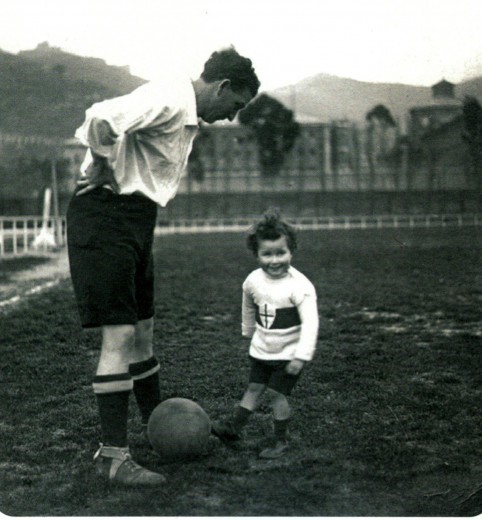When thinking of Italian football’s pioneers, William Garbutt may not be the first name that springs to mind.
Born just outside of Stockport in 1883, Garbutt was a professional footballer who played for teams such as Reading, Woolwich Arsenal and Blackburn Rovers. However, his injury blighted career led him to retire at just 29-years-old and this prompted Garbutt to take the unusual route of searching for work abroad.
He emigrated to Genoa and various reasons are given as to why Liguria was his chosen destination. These varied from looking for work on the docks, to being approached by future Italy World Cup coach, Vittorio Pozzo, who had watched Garbutt play for Blackburn Rovers. Either way, Genoa C.F.C was the team who stood to benefit from the experience that Garbutt had gained from his days as a professional player in England.
Garbutt took the reins at the Grifoni in 1912 and although not a coach by trade, he introduced a training regime never previously seen in Italy. Concentrating on fitness, tactics and the technical ability of his players, the results were evident the following season as Genoa finished second in the Northern Championship in 1913. Garbutt’s attention to detail quickly earned him the respect of his players and they addressed their head coach as “mister”, a legacy that remains in Calcio today.
In 1915, Genoa won their first championship in eleven seasons despite having to wait until 1919 and the end of World War One to be awarded their title. However, controversy surrounded the Italian Football Federation’s decision to award the title to the Rossoblu, as they had not mathematically won the championship when the beginning of the War interrupted the season. Garbutt served his country during the War and after spending some time back in England, he returned to Italy. With a substantial pay rise, Garbutt turned Genoa into an unbeatable side as they won the 1922/23 Scudetto without tasting defeat.
The following season, they defended their title despite suffering three losses. This was to be the last of Genoa’s nine Scudetti as the following season they lost a highly controversial play-off match against a Bologna side that had close links to the Fascist Party member, Leandro Arpinati – all this was set against the back drop of Benito Mussolini coming to power.
After helping Vittorio Pozzo prepare the Italian squad for the 1924 Olympic Games, Garbutt decided to embark on a new adventure. In 1927/28, the Englishman took control of AS Roma and during his two-year tenure, he guided the Capital club to success in the Coppa Coni, the then equivalent of the Coppa Italia. Following his Roman adventure, the Englishman and his wife, Anna, made a life changing move to Naples as Garbutt became the coach of SSC Napoli.
During his six seasons with the Partenopei, they finished third on three consecutive occasions (1932-34), which at that point, were the club’s highest ever finishing positions. Whilst living in Naples, Garbutt and his wife adopted a young orphan girl called Concettina Ciletti, a move that further endeared the family to the locals. Continuing his football journey away from his homeland, Garbutt and his family would later move to Spain where the Englishman won a Spanish title with Athletic Bilbao before fleeing the country as civil war broke out. Garbutt would return to Italy once again, this time to take charge of AC Milan for part of the 1936/37 season, taking them from tenth to a credible fourth place finish.
Despite having experienced success elsewhere on the peninsula, Genoa was the club that remained close to Garbutt’s heart and a return to his ‘second home’ beckoned. The ‘mister’ took charge of his beloved Genoa for a second time and during his first season back, the Grifoni finished third. However, his tenure was interrupted one again, this time by the start of World War Two. During the years of the Second World War, Italy’s alliance with Germany meant Garbutt and his family endured a period of internment and fearing for their lives, they assumed false identities. They eventually settled in the Emilia Romagna region of Imola where tragedy struck, as Garbutt’s wife was killed in May 1944 in a bombing raid.
The war ended and Garbutt returned to England. However, Genoa were keen to have their legendary ‘mister’ back at the helm. The experienced coach was persuaded and on September 22, 1946, Genoa played Brescia at the Stadio Luigi Ferraris and the crowd stood to applaud the now ageing Englishman, who saw his team cruise to a 4-0 win. Nevertheless, there would be no fairy tale championship title for Garbutt, as Genoa finished the season in tenth place. He would finally call time on an illustrious career in 1949, by which time life had taken its toll and he was an ill man.
In 1951, the Genoa icon left the city with a heavy heart, returning to England, a country in which he had lived for just one year since 1912. As such, while Garbutt’s exploits in Italy had secured his name in Calcio history, he received no hero’s welcome upon his return to England. Indeed, when he died at the age of 84 in the care of his adopted Italian daughter, Italian newspapers paid extensive tributes to Garbutt and his career while not one British newspaper wrote an obituary. Today, his contribution to the Italian game has received the recognition it deserves in Britain, with author Paul Edgerton having published a book on Garbutt’s exploits on the peninsula.
“Mister” William Garbutt was a pioneer and took a path that even modern English mangers are very reluctant to take. He took Genoa to heights that they have since been unable to scale and his success in Italy and Spain has left a lasting legacy abroad. Garbutt’s contribution to Calcio is still fondly remembered on the peninsula and he is remembered to this day as one of Italian football’s English fathers.

